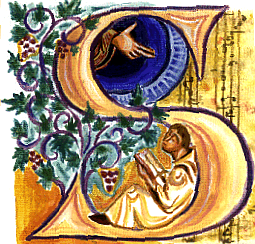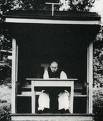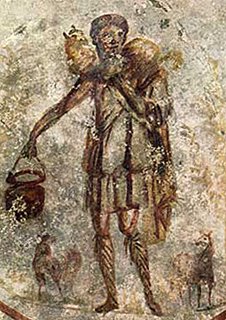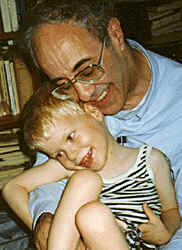 As we mark the end of this year and the beginning of another may we discover God's continued active involvement in our hearts and in this world. The Gospel of Mark describes the beginning of such a "new time" in an inaugural, abbreviated sermon of Jesus in his first chapter (1:15): "The time has come," He said. "The kingdom of God is near. Repent and believe the good news!"
As we mark the end of this year and the beginning of another may we discover God's continued active involvement in our hearts and in this world. The Gospel of Mark describes the beginning of such a "new time" in an inaugural, abbreviated sermon of Jesus in his first chapter (1:15): "The time has come," He said. "The kingdom of God is near. Repent and believe the good news!" Sunday, December 31, 2006
A Moment in Time
 As we mark the end of this year and the beginning of another may we discover God's continued active involvement in our hearts and in this world. The Gospel of Mark describes the beginning of such a "new time" in an inaugural, abbreviated sermon of Jesus in his first chapter (1:15): "The time has come," He said. "The kingdom of God is near. Repent and believe the good news!"
As we mark the end of this year and the beginning of another may we discover God's continued active involvement in our hearts and in this world. The Gospel of Mark describes the beginning of such a "new time" in an inaugural, abbreviated sermon of Jesus in his first chapter (1:15): "The time has come," He said. "The kingdom of God is near. Repent and believe the good news!" Friday, December 29, 2006
Joy in work
 "There can be no joy in living without joy in work." - Thomas Aquinas
"There can be no joy in living without joy in work." - Thomas AquinasMonday, December 25, 2006
Christmas Greetings
Saturday, December 23, 2006
First Edition of JBPL and Date of Research Roundtable
 It is with great joy that I can announce that the first edition of the Journal of Biblical Perspectives in Leadership is online today. I am very grateful for all the hard work by the production staff to get this first edition ready.
It is with great joy that I can announce that the first edition of the Journal of Biblical Perspectives in Leadership is online today. I am very grateful for all the hard work by the production staff to get this first edition ready.The School of Global Leadership and Entrepreneurship of Regent University will host the inaugural Biblical Perspectives in Leadership Research Roundtable on May 8, 2007 at the Founders Inn and Conference Center located on the campus of Regent University in Virginia Beach, VA.
The Biblical Perspectives in Leadership Research Roundtable is an attempt to create a platform of discussion and exploration where scholars, researchers, ministers and practitioners who are interested in research and exploration of leadership studies focused on the Hebrew and Christian scriptures can present and test their research. The roundtable invites papers and discussion forums covering topics such as:
- The use of exegetical methods to explore leadership
- The relationship between scripture, faith, theology and leadership
- Models of biblical spirituality and leadership
- Models of tribal and other forms of leadership in the Pentateuch
- Models of ruling, leadership, governing and organizational structures in the history of early Israel
- Leadership values in the wisdom writings of the Hebrew scriptures
- The relationship between prophecy and contextual leadership in the prophetic material of the Hebrew scriptures
- Comparative studies of leaders and leadership models across the Hebrew and Christian scriptures
- Historical studies of leaders in the Hebrew and Christian scriptures
Group dynamics in the Gospels - Historical Jesus and leadership research
- Pauline perspectives in leadership
- Organizational design and dynamics in the early faith communities of the Christian scriptures
- Follower-leader relationships in the Christian scriptures
- Organizational and leadership values in the Christian scriptures
- Models of spiritual and leadership formation in the Christian scriptures
- Models of future studies and strategic foresight in the apocalyptic material of the Hebrew and Christian scriptures
Please contact Dr. Corné Bekker, the editor of the Journal for Biblical Perspectives in Leadership (JBPL) for further details regarding the registration costs, program and submission guidelines. He can be reached at clbekker@regent.edu
Thursday, December 21, 2006
Christmas Message from Dr. Bruce Winston
 Here is a link to a wonderful Christmas audio message from Dr. Bruce E. Winston, the Dean of the School of Global Leadership and Entrepreneurship at Regent University. In this message Dr. Winston illustrates God 's use of organizations and leaders in accomplishing His work as seen in the Gospel story of the birth of Jesus.
Here is a link to a wonderful Christmas audio message from Dr. Bruce E. Winston, the Dean of the School of Global Leadership and Entrepreneurship at Regent University. In this message Dr. Winston illustrates God 's use of organizations and leaders in accomplishing His work as seen in the Gospel story of the birth of Jesus.For your convenience, the audio message is provided in two audio formats below.
Real Media: http://real.regent.edu:8080/ramgen/schgle/misc/2006_christmas.rm
Microsoft Windows Media: http://media.regent.edu/schgle/misc/2006_christmas.wma
Advent Season: Towards Incarnational Leadership - Reflection 4
 My family loves Christmas. My wife, being Italian, always decorates our house with beautiful ornaments for Christmas - the focus of all the decorations a simple wooden creche (French for manger) depicting the birth of Jesus. My son played the part of a shepherd in a re-enactment of the nativity story, this last Sunday in church. Both these practices, the display of a creche and a "live" nativity play, go back to the life of the Christian leader, Francis of Assisi. Francis was deeply taken by the miracle of the incarnation and in an attempt to bring his audience back to the simplicity and humility of the birth of Jesus, created the first living nativity play in a small cave in Umbria, Italy in 1223. On Christmas eve of that year, he gathered with other believers to act out the birth of Jesus in all it's impoverished glory. Francis even included two animals: an ox and a donkey. He chose these animals in a materful attempt to reference Isaiah 1:3 which states:
My family loves Christmas. My wife, being Italian, always decorates our house with beautiful ornaments for Christmas - the focus of all the decorations a simple wooden creche (French for manger) depicting the birth of Jesus. My son played the part of a shepherd in a re-enactment of the nativity story, this last Sunday in church. Both these practices, the display of a creche and a "live" nativity play, go back to the life of the Christian leader, Francis of Assisi. Francis was deeply taken by the miracle of the incarnation and in an attempt to bring his audience back to the simplicity and humility of the birth of Jesus, created the first living nativity play in a small cave in Umbria, Italy in 1223. On Christmas eve of that year, he gathered with other believers to act out the birth of Jesus in all it's impoverished glory. Francis even included two animals: an ox and a donkey. He chose these animals in a materful attempt to reference Isaiah 1:3 which states: "The ox knows its owner, and the ass its master's crib; but Israel does not know, my people does not understand."
"It happened in the third year before his death, that in order to excite the inhabitants of Grecio to commemorate the nativity of the Infant Jesus with great devotion, [St. Francis] determined to keep it with all possible solemnity; and lest he should be accused of lightness or novelty, he asked and obtained the permission of the sovereign Pontiff. Then he prepared a manger, and brought hay, and an ox and an ass to the place appointed. The brethren were summoned, the people ran together, the forest resounded with their voices, and that venerable night was made glorious by many and brilliant lights and sonorous psalms of praise. The man of God [St. Francis] stood before the manger, full of devotion and piety, bathed in tears and radiant with joy; the Holy Gospel was chanted by Francis, the Levite of Christ. Then he preached to the people around the nativity of the poor King; and being unable to utter His name for the tenderness of His love, He called Him the Babe of Bethlehem. A certain valiant and veracious soldier, Master John of Grecio, who, for the love of Christ, had left the warfare of this world, and become a dear friend of this holy man, affirmed that he beheld an Infant marvellously beautiful, sleeping in the manger, Whom the blessed Father Francis embraced with both his arms, as if he would awake Him from sleep. This vision of the devout soldier is credible, not only by reason of the sanctity of him that saw it, but by reason of the miracles which afterwards confirmed its truth. For the example of Francis, if it be considered by the world, is doubtless sufficient to excite all hearts which are negligent in the faith of Christ; and the hay of that manger, being preserved by the people, miraculously cured all diseases of cattle, and many other pestilences; God thus in all things glorifying his servant, and witnessing to the great efficacy of his holy prayers by manifest prodigies and miracles."
"The Word became flesh and made His dwelling among us. We have seen His glory, the glory of the One and Only, who came from the Father, full of grace and truth." (John 1:14)
A Long View of History
 I found two interesting interactive maps this morning that track the world-wide growth of religion and the imperial history of the middle-east. These interactive maps from a website called "Maps of War (www.mapsofwar.com)" can be found at the following links:
I found two interesting interactive maps this morning that track the world-wide growth of religion and the imperial history of the middle-east. These interactive maps from a website called "Maps of War (www.mapsofwar.com)" can be found at the following links:Tuesday, December 19, 2006
The Joys of Zero
 I am re-reading Dallas Willard's great book on the Gospel of Jesus, "The Divine Conspiracy" this week and kept going back to the centrality of the "secrecy motif" in the service that Jesus asks for in the Gospels of Matthew and Mark. It seems that this call to secret service remains an important, if not central, element in the recovery of authentic Christian Leadership.
I am re-reading Dallas Willard's great book on the Gospel of Jesus, "The Divine Conspiracy" this week and kept going back to the centrality of the "secrecy motif" in the service that Jesus asks for in the Gospels of Matthew and Mark. It seems that this call to secret service remains an important, if not central, element in the recovery of authentic Christian Leadership.Willard's great contribution in this book is that he links the Gospel call to secret service (or service in obscurity) with freedom from dependency on reputation and material wealth - precisely the "stuff" contemporary leadership studies are so enthralled by.
As I am re-reading this provocative book I could not help but to hear Sam Phillips singing in the background. The inherent falseness of the promises of power and prestige is a common theme that runs through the lyrics of her songs. One example is the lyrics of the song "Zero, Zero, Zero" from her very experimental disk: "Omnipop: It is only a fleshwound Lampchop":
Shane Helmer reviews Phillips' Omnipop and picks up on this central theme of power/powerlessness in her music:
"Pop culture seems obsessed with its own definition of success. Money and power equate with popularity and position. Those who do not fit neatly into the equation are continuously reminded by pop culture icons, who ironically have achieved such success, that they are zeros in society. Admittedly, 'regular folk' feel powerless sometimes. But to have this perception so intricately woven into our culture's consciousness robs us of our enthusiasm for living and crushes our dreams beneath the cynical wreckage of society. There seems to be far too much whining and not enough constructive criticism. It is into this tension, this world of zero-speak, that singer-songwriter Sam Phillips wedges a truly alternative perspective."
The question of what to do with power remains an important element in our search for authentic, Biblical Leadership.
Further Reading:
"Sam Phillips' sardonic look at popular culture" by Shane Helmer. Music Review: Omnipop (It's Only a Flesh Wound Lambchop) by Sam Phillips. (Virgin Records: 1996).
"The Divine Conspiracy" by Dallas Willard. HarperSanFrancisco (1998).
Thursday, December 14, 2006
Leadership Talks: The Values of Incarnational Leadership
 I did a recording last week for Leadership Talks entitled "The Values of Incarnational Leadership". Here is a synopsis of the talk:
I did a recording last week for Leadership Talks entitled "The Values of Incarnational Leadership". Here is a synopsis of the talk:Tuesday, December 12, 2006
John Calvin on the role of Scripture in the formation of Ethical Conduct
 I have been re-reading Calvin this week and especially his understanding of the role of Scripture in the formation of ethical conduct. Calvin comments that when we devote ourselves to the study of Scripture that this devotional discipline aids in the values conversion the Gospel demands:
I have been re-reading Calvin this week and especially his understanding of the role of Scripture in the formation of ethical conduct. Calvin comments that when we devote ourselves to the study of Scripture that this devotional discipline aids in the values conversion the Gospel demands:"This is also evidence of great progress: that, almost forgetful of ourselves, surely subordinating our self-concern, we try faithfully to devote our zeal to God and his Commandments. For when scripture bids us leave off self-concern, it not only erases from our minds the yearning to possess, the desire for power, and the favor of men, but it also uproots ambition and all craving for human glory and other more secret plagues. Accordingly, the Christian must surely be so disposed and minded that he feels within himself it is with God he has to deal throughout his life. In this way, as he will refer all he does to God's decision and judgment, so will he refer his whole intention of mind scrupulously to Him... “
We seem to have lost something today of the formative power of reading and studying God's Word.
For more on this see Luder G. Witlock’s excellent article, “Spiritual direction in the Reformed tradition.” in the Journal of Psychology and Theology. December, 2002.
Monday, December 11, 2006
Advent Season: Towards Incarnational Leadership - Reflection 3
 A good friend of mine directed me to an advent sermon by Thomas Merton that I have not seen before. Merton makes use of the Lukan observation that there was no room for Joseph, Mary and Jesus to eplore the message of values reversal present in the Gospel birth narratives. The implications for Christian leadership is obvious:
A good friend of mine directed me to an advent sermon by Thomas Merton that I have not seen before. Merton makes use of the Lukan observation that there was no room for Joseph, Mary and Jesus to eplore the message of values reversal present in the Gospel birth narratives. The implications for Christian leadership is obvious:Friday, December 08, 2006
The Birth of Jesus in the New Testament
 I wrote a short introduction to the birth narratives of Jesus in the Gospels of the New Testament for cbn.com this week. The following is the conclusion of the article and a call for a rediscovery, appreciation and application of these powerful narratives:
I wrote a short introduction to the birth narratives of Jesus in the Gospels of the New Testament for cbn.com this week. The following is the conclusion of the article and a call for a rediscovery, appreciation and application of these powerful narratives:Thursday, December 07, 2006
Advent Season: Towards Incarnational Leadership - Reflection 2
 I read an interesting comparison between institutional and incarnational leaders a few days back on a leadership blog. I am not sure that they are competing or even differing models (things are never as simple as this) - but is well worth the read and does help to refine our thoughts in our on-going quest to recover an incarnational approach in leadership. The blog includes the following comparison:
I read an interesting comparison between institutional and incarnational leaders a few days back on a leadership blog. I am not sure that they are competing or even differing models (things are never as simple as this) - but is well worth the read and does help to refine our thoughts in our on-going quest to recover an incarnational approach in leadership. The blog includes the following comparison:* Institutional leaders lead because the institution has passed them as fit to lead.
* Incarnational leaders lead because they emerge from being rooted in a community into recognised leadership.
* Institutional leaders carry their own style into the church and shape it to their preference.
* Incarnational leaders only get to lead because their style fits with the culture of the community they lead
* Institutional leaders are vested with power and authority by the institution.
* Incarnational leaders are granted their power and authority by the community they lead.
* Institutional leaders can still hold leadership positions whether or not they practice what they preach.
* Incarnational leaders can not assume that same luxury (or indulgence?).
* Institutional leaders can live off the admiration and adulation of the congregation.
* Incarnational leaders must continually re-earn their place as leaders. Their power and respect rises and falls with the perceived level of their integrity, authenticity, and deep commitment to the life of the community.
Here is a link to the original blog:
http://craftycurate.blogs.com/pilgrims_progress/2004/10/leadership_inst.html
Wednesday, December 06, 2006
New Book on the Spirituality of Henri Nouwen
 There is a new book out on the Spirituality of Imperfection of Henri Nouwen by Wil Hernandez. Nouwen remains an important source and for the on-going quest in the recovery of authentic Christian Leadership. The following is a link to this new book at Amazon.com:
There is a new book out on the Spirituality of Imperfection of Henri Nouwen by Wil Hernandez. Nouwen remains an important source and for the on-going quest in the recovery of authentic Christian Leadership. The following is a link to this new book at Amazon.com:http://www.amazon.com/Henri-Nouwen-Spirituality-Imperfection-Hernandez/dp/0809144344/sr=1-1/qid=1165288616/ref=pd_bbs_sr_1/103-2415131-3367037?ie=UTF8&s=books
Nouwen's great contribution to our understanding of Christian Leadership is best summarized in his book: "In the Name of Jesus: Reflections on Christian Leadership." Nouwen wrote this book shortly after he left a position of great status and privilege at Harvard University to go and live amongst mentally handicapped people in the L'Arche Community. The following excerpt from this book show Nouwen's theology of voluntary self-limitation as the first step in the recovery of authentic Christian Leadership:
"The first thing that struck me when I came to live in a house with mentally handicapped people was that their liking or disliking of me had absolutely nothing to do with any of the many useful things I had done until then. Since nobody could read my books, my books could not impress anyone, and since most of them never went to school, my twenty years at Notre Dame, Yale and Harvard did not provide a significant introduction.… Not being able to use any of the skills that had proved so practical in the past was a real source of anxiety. I was suddenly faced with my naked self, open for affirmations and rejections, hugs and punches, smiles and tears, all dependent on how I was perceived at the moment. In a way, it seemed as though I was starting my life all over again. Relationships, connections, reputations could no longer be counted upon. This experience was and, in many ways, is the most important experience of my new life because it forced me to rediscover my true identity. These broken, wounded and completely unpretentious people forced me to let go of my relevant self—the self that can do things, show things, prove things, build things—and forced me to reclaim that unadorned self in which I am completely vulnerable, open to receive and give love regardless of any accomplishments.”
Tuesday, December 05, 2006
Advent Season: Towards Incarnational Leadership - Reflection 1
 I recorded a short audio recording today on the call to incarnational leadership found in the birth narratives of Jesus in the Gospels of the New Testament. The following quote from Bill Robinson, the president of Whitworth College in Spokane, Washington goes a long way to define the call to incarnational leadership:
I recorded a short audio recording today on the call to incarnational leadership found in the birth narratives of Jesus in the Gospels of the New Testament. The following quote from Bill Robinson, the president of Whitworth College in Spokane, Washington goes a long way to define the call to incarnational leadership:May the Word become Flesh in our Leadership.
Monday, December 04, 2006
Leadership that embraces Humanity
 Discussions on the interpretation of Christ “being found in appearance as a man” (σχήματι εὑρεθεὶς ὡς ἄνθρωπος) in the Philippians hymn has been traditionally riddled with controversy and rigorous debate (Howard 1978, 368). Re-reading the hymn as an ethical exemplum has opened a new and promising avenue for a discussion on the social values that the hymn proposes in a society riddled with social inequalities and thus holds many practical applications for Christian leadership. Albert Nolan (1977, 135), in his response to apartheid in South Africa, used the Philippians hymn to construct a new perspective in ontological Christology that demands a new appreciation of the humanity of Christ and thus of others:
Discussions on the interpretation of Christ “being found in appearance as a man” (σχήματι εὑρεθεὶς ὡς ἄνθρωπος) in the Philippians hymn has been traditionally riddled with controversy and rigorous debate (Howard 1978, 368). Re-reading the hymn as an ethical exemplum has opened a new and promising avenue for a discussion on the social values that the hymn proposes in a society riddled with social inequalities and thus holds many practical applications for Christian leadership. Albert Nolan (1977, 135), in his response to apartheid in South Africa, used the Philippians hymn to construct a new perspective in ontological Christology that demands a new appreciation of the humanity of Christ and thus of others:“Whatever humanity and divinity may mean in terms of a static philosophy of
metaphysical natures, in religious terms for the man who recognizes Jesus as
his God, the human and the divine has been brought together in such a way
that they now represent one and the same religious value. In this sense
Jesus’ divinity is not something totally different from His humanity. Jesus’
divinity is the transcendent depth of His humanity. Jesus was immeasurably
more human than other men…”
Regardless of some of the obvious theological difficulties of some of Nolan’s arguments, his Christology does open exciting possibilities in ethical discussions in leadership and service.
In embracing the His own humanity and thus the humanity of others, Jesus “redefined neighbor in terms of praxis, not propinquity” (Sorenson 2004, 461). This “praxis” is one of charity, identification with the one being served and of authentic love. Vanstone (1978) has developed a phenomenology of love in which he characterizes three characteristics of authentic love (Gregerson 2003, 371-372). Authentic love is limitless, precarious and vulnerable (Vanstone 1978, 44-51).
- Authentic love therefore does not impose boundaries on others (limitless) but “accepts without limit the discipline of the circumstances” (Vanstone 1978, 44),
- is precarious in that it avoids the “the distortion of possessive control” (Gregerson 2003, 372)
- and finally true love revels in being vulnerable in that it gives the one loved a “power that could not otherwise be there” (Vanstone 1978, 51).
Christian Leadership that takes the call to Christological mimesis seriously will exhibit this embracing of humanity in love that is limitless, precarious and vulnerable.
Further Reading:
Howard, G. 1978. Phil. 2:6-11 and the Human Christ. Catholic Biblical Quarterly 40(3): 368-387.
Nolan, A. 1977. Jesus before Christianity. Cape Town: David Phillips.
Sorenson, R. L. 2004. Kenosis and Alterity in Christian Spirituality. Psychoanalytic Psychology. Vol. 21, No. 3, 458-462.
Vanstone, W. H. 1978. The Risk of Love. New York: Oxford University Press.
Thursday, November 30, 2006
The Dark Night of the Soul
 I am presenting a lecture later today on the approach to spiritual direction of the Spanish Reformers of the 15th century: John of the Cross and Teresa of Avila. John of the Cross remains an important guide in the quest for authentic Christian formation and thus leadership.
I am presenting a lecture later today on the approach to spiritual direction of the Spanish Reformers of the 15th century: John of the Cross and Teresa of Avila. John of the Cross remains an important guide in the quest for authentic Christian formation and thus leadership.John's image of the "dark night of the soul" as a necessary step in our formation and journey towards God stands unmatched. He says it best in his famous poem:
In darkness, and secure, by the secret ladder, disguised
On that glad night, in secret, for no one saw me,
This guided me more surely than the light of noon
O guiding night!
Upon my flowering breast, which I kept wholly for Him alone,
Wednesday, November 29, 2006
Silence and Leadership
 I am re-reading portions of the Philokalia (the Sayings of the Desert Fathers and Mothers) as part of my morning devotions and am struck once again by the centrality that these sayings give to ethical conduct in leadership. The connection between the "control of the tongue" and ethical conduct is often made by these early Christian hermits. Two stories from this time will suffice to illustrate this point:
I am re-reading portions of the Philokalia (the Sayings of the Desert Fathers and Mothers) as part of my morning devotions and am struck once again by the centrality that these sayings give to ethical conduct in leadership. The connection between the "control of the tongue" and ethical conduct is often made by these early Christian hermits. Two stories from this time will suffice to illustrate this point:Tuesday, November 28, 2006
To be a Disciplined Disciple
 I am reminded this morning of the semantic similarity between the concepts of discipline and disciple. To be a disciple/follower of Jesus is to live a disciplined life. Thomas Merton describes this commitment to a disciplined life in the language of the appropriation of the cross of Jesus. To experience the "discipline of the cross" is to move from an ego-affirming spirituality to an ego-transcended approach to life and leadership. The contributions that this make in our search for authentic leadership are obvious.
I am reminded this morning of the semantic similarity between the concepts of discipline and disciple. To be a disciple/follower of Jesus is to live a disciplined life. Thomas Merton describes this commitment to a disciplined life in the language of the appropriation of the cross of Jesus. To experience the "discipline of the cross" is to move from an ego-affirming spirituality to an ego-transcended approach to life and leadership. The contributions that this make in our search for authentic leadership are obvious.Monday, November 27, 2006
Winning at any Cost?
 I have been travelling, speaking and ministering for the last month, and so have not had the oppertunity to blog. This has been a providential time for me with lots of time for prayer, study and reflection. I continue to be taken by the extra-ordinary levels of competitiveness amongst Christian leaders. We compare and compete with one another and in a mad rush for legitimacy construct elaborate systems/ideologies that ensure that the world and the church know/acknowledge that we are the best, the greatest and on top. We parade our strengths, list our accomplishments, argue how only "our group/ordinations" can be traced back to the early Church (and thus to Jesus) and conduct an endless advertisement campaign to prove that all others are wrong and we are right. I wonder how this is different to the current "war" between certain fanatic Islamic groups and the Western world. But is it really about "winning"? Where is the "signature" of Jesus in the church and larger world today? How can we mirror the love, mercy and salvation that Jesus offers, if our greastest value is triumphing over others?
I have been travelling, speaking and ministering for the last month, and so have not had the oppertunity to blog. This has been a providential time for me with lots of time for prayer, study and reflection. I continue to be taken by the extra-ordinary levels of competitiveness amongst Christian leaders. We compare and compete with one another and in a mad rush for legitimacy construct elaborate systems/ideologies that ensure that the world and the church know/acknowledge that we are the best, the greatest and on top. We parade our strengths, list our accomplishments, argue how only "our group/ordinations" can be traced back to the early Church (and thus to Jesus) and conduct an endless advertisement campaign to prove that all others are wrong and we are right. I wonder how this is different to the current "war" between certain fanatic Islamic groups and the Western world. But is it really about "winning"? Where is the "signature" of Jesus in the church and larger world today? How can we mirror the love, mercy and salvation that Jesus offers, if our greastest value is triumphing over others?The Future according to Jesus
 I got word last week, whilst travelling in South Africa, that our proposal for a panel presentation on the future acoording to Jesus at the World Future Association's International Conference in 2007 has been accepted. Lots of thanks and appreciation go to Jay Gary (PeakFutures, Colorado Springs: USA) and Tsvi Bisk (Center for Strategic Futurist Thinking, Jerusalem: Israel) for graciously inviting me to do this presentation with them. Here is an abstract of our presentation:
I got word last week, whilst travelling in South Africa, that our proposal for a panel presentation on the future acoording to Jesus at the World Future Association's International Conference in 2007 has been accepted. Lots of thanks and appreciation go to Jay Gary (PeakFutures, Colorado Springs: USA) and Tsvi Bisk (Center for Strategic Futurist Thinking, Jerusalem: Israel) for graciously inviting me to do this presentation with them. Here is an abstract of our presentation:Futurists often encounter religionists who hold views that undercut future-oriented behavior, including determinism, fatalism, or millennial beliefs. But as a Palestinian Jew, what was Jesus’ real view of the future? And how does that view compare with that of futurists who focus on “this world,” rather than the next? Drawing on historical Jesus research, this session identifies three driving forces of the first century, and argues that Jesus rejected the conventional and counter-futures of His time to envision a creative future for His generation. This first-century foresight will then be compared and contrasted with 21st century global scenario frameworks to consider how visionary leadership might shift society's deeply ingrained attitudes toward impending conflicts and catastrophes.
Monday, October 30, 2006
Developments in African Leadership
 I am chairing another panel presentation (this week at the International Leadership Assocation [ILA] Conference in Chicago) on African Models of Leadership entitled, "Developments in African Leadership: A Renaissance of Values-based Leadership Approaches", with Drs. Jeff Hale, Kathleen Patterson and Bruce Winston. Here follows an abstract of the presentation:
I am chairing another panel presentation (this week at the International Leadership Assocation [ILA] Conference in Chicago) on African Models of Leadership entitled, "Developments in African Leadership: A Renaissance of Values-based Leadership Approaches", with Drs. Jeff Hale, Kathleen Patterson and Bruce Winston. Here follows an abstract of the presentation:Towards an Understanding of Leadership and Spirituality
 I am chairing a panel entitled "Towards an Understanding of Leadership and Spirituality", this week at the International Leadership Association (ILA) Conference in Chicago, with Drs. Diane Chandler, Michael Hartsfield and Karin Klenke. Here is an abstract of the session:
I am chairing a panel entitled "Towards an Understanding of Leadership and Spirituality", this week at the International Leadership Association (ILA) Conference in Chicago, with Drs. Diane Chandler, Michael Hartsfield and Karin Klenke. Here is an abstract of the session:Sunday, October 29, 2006
The Deceit of Pride
 Pride is deceitful. A telling old Jewish joke shows the changing face of pride. In the village synagogue, during the High Holidays, the rabbi prostrates himself on the floor, saying, "God, before You I am nothing." Immediately the richest man in town prostrates himself on the floor, saying, "God, before You I am nothing." Right after that the town beggar prostrates himself on the floor, saying, "God, before You I am nothing." The rich man whispers to the rabbi,"Look who thinks he's nothing."
Pride is deceitful. A telling old Jewish joke shows the changing face of pride. In the village synagogue, during the High Holidays, the rabbi prostrates himself on the floor, saying, "God, before You I am nothing." Immediately the richest man in town prostrates himself on the floor, saying, "God, before You I am nothing." Right after that the town beggar prostrates himself on the floor, saying, "God, before You I am nothing." The rich man whispers to the rabbi,"Look who thinks he's nothing."Dr. Paul Wong, Professor at Western Trinity University proposes the following practices in the pursuit of humilty, practices that I think translates very well to organizational leadership behavior:
* Acknowledging our wrong doing
* Receiving correction and feedback graciously
* Refraining from criticizing others
* Forgiving others who have wronged us
* Apologizing to others who have been wronged by us
* Enduring unfair treatments with patience and a forgiving spirit
* Thinking and speaking about the good things of other people
* Rejoicing over other people's success
* Counting our blessings for everything, good and bad
* Seeking opportunities to serve others
* Willing to remain anonymous in helping others
* Showing gratitude for our successes
* Giving due credit to others for our successes
* Treating success as a responsibility to do more for others
* Willing to learn from our failures
* Assuming responsibility for our failures
* Accepting our limitations and circumstances
* Accepting social reality of discrimination and prejudice
* Treating all people with respect regardless of their social status
* Enjoying the lowly status of being an outsider and a nobody
Hellen Keller, the great teacher, once declared: "I long to accomplish a great and noble task, but it is my chief duty to accomplish humble tasks as though they were great and noble. The world is moved along, not only by the mighty shoves of its heroes, but also by the aggregate of the tiny pushes of each honest worker. "
Picture:Kendell Geers 2006. Seven Deadly Sins (Pride). Ultra-violet Neon Sculpture. Stephen Friedman Gallery, London.
Further Reading:
Here is a link to Professor Wong's essay on humility:
http://www.meaning.ca/articles/presidents_column/humility_nov03.htm
Thursday, October 26, 2006
Lead as by the Spirit
 I read the following, this morning, from the wonderful "Counsels of Light and Love" of the 16th century Spanish Christian leaders, John of the Cross:
I read the following, this morning, from the wonderful "Counsels of Light and Love" of the 16th century Spanish Christian leaders, John of the Cross:Wednesday, October 25, 2006
Prayer as Revolt
 I received the quote below from Thomas Merton's great book "Conjectures of a Guilty Bystander" today through a listserve that I am registered with. I like the idea of prayer as revolt. How do we change sick organizations? Merton proposes that it starts with prayer:
I received the quote below from Thomas Merton's great book "Conjectures of a Guilty Bystander" today through a listserve that I am registered with. I like the idea of prayer as revolt. How do we change sick organizations? Merton proposes that it starts with prayer:Tuesday, October 24, 2006
New Edition of Leadership Advance
The Power of Humble Love

In the Eastern Orthodox tradition at its best, the spiritual father has always sought to avoid any kind of constraint and spiritual violence in his relations with his disciple. If, under the guidance of the Spirit, he speaks and acts with authority, it is with the authority of humble love. The words of Abba Zosima in The Brothers Karamazov express an essential aspect of spiritual fatherhood: "At some ideas you stand perplexed, especially at the sight of men's sin, uncertain whether to combat it by force or by humble love. Always decide, 'I will combat it by humble love.' If you make up your mind about that once and for all, you can conquer the whole world. Loving humility is a terrible force; it is the strongest of all things and there is nothing like it."
Monday, October 23, 2006
Humility and Christian Scholarship

Friday, October 20, 2006
Leadership free from the desire to dominate

Amma Theodora said, 'Let us strive to enter by the narrow gate, Just as the trees, if they have not stood before the winter's storms cannot bear fruit, so it is with us; this present age is a storm and it is only through many trials and temptations that we can obtain an inheritance in the kingdom of heaven.' The same Amma said that a teacher ought to be a stranger to the desire for domination, vain-glory, and pride; one should not be able to fool him by flattery, nor blind him by gifts, nor conquer him by the stomach, nor dominate him by anger; but he should be patient, gentle and humble as far as possible; he must be tested and without partisanship, full of concern, and a lover of souls.
Thursday, October 19, 2006
Monday, October 16, 2006
Socio-Rhetorical Criticism and the Promise it Holds for Leadership Study

Friday, October 13, 2006
Common Humanity in African Leadership
 I am preparing a paper on emerging African approaches to humane leadership as well as finalizing the itinerary for an up-coming trip to South Africa, and thus have been thinking about the promise that a humane approach to leadership (such as the African philosophy of Ubuntu) holds for the re-building of the continent.
I am preparing a paper on emerging African approaches to humane leadership as well as finalizing the itinerary for an up-coming trip to South Africa, and thus have been thinking about the promise that a humane approach to leadership (such as the African philosophy of Ubuntu) holds for the re-building of the continent.Louw (2003) explains the basic premise of ubuntu: “Ubuntu serves as the spiritual foundation of African societies. It is a unifying vision or world view enshrined in the Zulu maxim 'umuntu ngumuntu ngabantu', i.e. ‘a person is a person through other persons’.” The birth of the new democratic nation of South Africa opens the door for a rediscovery of the possibilities of a humane approach to leadership. Maphisa (2004), writing on the eve of the birth of the new democracy says: “South Africans are slowly re-discovering their common humanity. Gone are the days when people were stripped of their dignity (ubuntu) through harsh laws. Gone are the days when people had to use ubulwane [i.e. animal like behaviour] to uphold or reinforce those laws. I suggest that the transformation of an apartheid South Africa into a democracy is a re-discovery of ubuntu”.
There is a similar approach in Paul's letter to the Phillipians (2:2-3) that is rooted in a mimetic devotion of Jesus as the Son of God. He writes: "Let nothing be done through selfish ambition or conceit, but in lowliness of mind let each esteem others better than himself. Let each of you look out not only for his own interests, but also for the interests of others.”
Further Reading:
Louw, D J 2003. Ubuntu: An African Assessment of the Religious Other. Unpublished paper: University of the North.
Maphisa, Sisho. 1994. Man in constant search of Ubuntu: a dramatist's obsession. Pretoria: Ubuntu School of Philosophy.
Thursday, October 12, 2006
The Devotional Discipline of Study
 The Biblical, devotional discipline of study has been one on of the "lost" disciplines of recent Evangelical Christianity. There seems to be a hesitancy to think of the mind as an avenue to transformation. Donald Whitney said it best: “Why do we seem to think we must choose between the two? Why do many Christians live as though they've been told, ‘Choose you this day whom you will serve: scholarship or devotion’? I maintain that a Biblically balanced Christian has both a full head and a full heart, radiating both spiritual light and heat.”
The Biblical, devotional discipline of study has been one on of the "lost" disciplines of recent Evangelical Christianity. There seems to be a hesitancy to think of the mind as an avenue to transformation. Donald Whitney said it best: “Why do we seem to think we must choose between the two? Why do many Christians live as though they've been told, ‘Choose you this day whom you will serve: scholarship or devotion’? I maintain that a Biblically balanced Christian has both a full head and a full heart, radiating both spiritual light and heat.”The wisdom of the ages would suggest that we need to consider study as worship, as an avenue in which God brings transformation to our inner and outer worlds. Karl Barth points us in this direction: “In prayer, theological work is the inner, spiritual and vertically directed motion of man; while I study, although similarly external, it runs in a horizontal direction. It is also an intellectual, and physical, if not fleshly, movement. Theological work can be done only in the indissoluble unity of prayer and study. Prayer without study would be empty. Study without prayer would be blind.”
May we recover a Biblical approach to study that will aid us in the re-discovery of a humble, authentic and transforming approach to leadership.
Wednesday, October 11, 2006
The Evangelical Mind Revisited
 I, together with my colleagues at Regent University, am meeting Professor Alan Wolfe, later today, to discuss his opinion article entitled; "The Evangelical Mind Revisited."Alan Wolfe is a professor of political science and director of the Boisi Center for Religion and American Public Life at Boston College.
I, together with my colleagues at Regent University, am meeting Professor Alan Wolfe, later today, to discuss his opinion article entitled; "The Evangelical Mind Revisited."Alan Wolfe is a professor of political science and director of the Boisi Center for Religion and American Public Life at Boston College.Professor Wolfe writes:
"One other significant challenge faces evangelical institutions determined to take seriously the life of the mind: they have to make a decision about truth. This ought not to be a problem for them, since serious Christians do not think that their views about God's existence are just matters of opinion. They are convinced that claims of faith are truth claims. Indeed, one of the main gripes conservative Christians have about secularists is their presumed moral relativism, their unwillingness to say flat out that certain things are true (or good or just), and other things are not."
I welcome the oppertunity to enter into discussion with Professor Wolfe and others on these thoughts. I am convinced that a strong, vibrant faith is marked by the willingness to enter into honest, humble and yet rigorous debate about what we perceive to be [T]rue. Truth, if it indeed is true, can hold its own ground.
I am reminded of the words of Caleb Colton (writing of the Biblical devotional discipline of study):
“He that studies only men, will get the body of knowledge without the soul; and he that studies only books, the soul without the body. He that, to what he sees, adds observation, and to what he reads, reflection, is in the right road to knowledge, provided that in scrutinizing the hearts of others, he neglects not his own...”
May our pursuit of understanding reality and He who is "ultimate Real" lead us to the scrutiny of our own hearts and renew our commitment to follow Him, who is the Way, the Truth and the Life (see John 14:6).
Here is a link to Professor Wolfe's article:
http://www.carnegiefoundation.org/change/sub.asp?key=98&subkey=1119
Tuesday, October 10, 2006
New Publication in Christian Spirituality Research
 We recently had the joy of hosting Professor Celia Kourie, Professor and author in Christian Spirituality from the University of South Africa and St. Augustine's College. Celia recently co-edited a new publication on research approaches in Christian Spirituality. This publication is the eigth supplemtum to the Acta Theologica Journal. The book is entitled: "The Spirit that moves: Orientation and Issues in Spirituality." (ISBN: 0-86886-713-6). It is worthwhile getting. The research approaches and orientations mentioned in this publication opens many doors for scholars exploring authentic Christian spirituality in leadership.
We recently had the joy of hosting Professor Celia Kourie, Professor and author in Christian Spirituality from the University of South Africa and St. Augustine's College. Celia recently co-edited a new publication on research approaches in Christian Spirituality. This publication is the eigth supplemtum to the Acta Theologica Journal. The book is entitled: "The Spirit that moves: Orientation and Issues in Spirituality." (ISBN: 0-86886-713-6). It is worthwhile getting. The research approaches and orientations mentioned in this publication opens many doors for scholars exploring authentic Christian spirituality in leadership.Kourie writes about the promise that the renewed interest in spirituality brings (2006:35):
" We are witnessing a renewal of interest in perhaps what is one of the oldest traditions in human history, namely, the transmission of spiritual wisdom...It is my contention that the 'turn' to spirituality, both general and academic, will help bring about an ecumenical transformation of consciousness, which will elucidate the many-faceted spendour and diverse ways in which to discover Ultimate Reality."
Source:
De Villiers, P.G.R; Kourie, C.E.T; and Lombaard, C. 2006. The Spirit that moves: Orientation and Issues in Spirituality. Acta Theologica Supplementum 8.
Monday, October 09, 2006
Research Avenues in Spirituality and Leadership
 Until recently, there has been a large gap in the literature and research that explore the spirituality of leadership. One exception is the theory of spiritual leadership developed by Fry (2003). One reason for the gap lies in the lack of consensus on the definition and description of the dynamics of spiritual formation as it relates to effective leadership development. A further concern is that the majority of curricula that deal with spirituality and leadership formation are based on non-Christian, or thoroughly secular philosophies and worldviews and as so do not provide much of an avenue for Christians to explore the integration of their faith within a leadership context. It is my conviction that the time has come to address and explore the desperate need for an orthodox, Biblically-based understanding of the nature and dynamics of spiritual formation as it relates to leadership development.
Until recently, there has been a large gap in the literature and research that explore the spirituality of leadership. One exception is the theory of spiritual leadership developed by Fry (2003). One reason for the gap lies in the lack of consensus on the definition and description of the dynamics of spiritual formation as it relates to effective leadership development. A further concern is that the majority of curricula that deal with spirituality and leadership formation are based on non-Christian, or thoroughly secular philosophies and worldviews and as so do not provide much of an avenue for Christians to explore the integration of their faith within a leadership context. It is my conviction that the time has come to address and explore the desperate need for an orthodox, Biblically-based understanding of the nature and dynamics of spiritual formation as it relates to leadership development.Current research in spirituality, characterized by multi-disciplinary, post-patriarchal, telluric and post-structuralist approaches, locates the phenomena of “spirit” in the ontology of values (see the work of Kees Waaijman for a broader treatment of this). Thus defined, spirituality is seen as the “ultimate” or “inner” values that provide meaning in life. This broad, defining approach provides a platform for scholars to examine a wide variety of spiritualities, ranging from religious to non-religious orientations. Current approaches in spirituality research advocates a “dialogical-phenomenological” research approach making use of the analytical, hermeneutic, mystagogic, form-descriptive, and systematic tools of theology, sociology and psychology.
Contemporary phenomenological investigations in spirituality research, distinguish three basic forms of spirituality (see the ground-breaking work of Kourie and Waaijman in this field): (a) established schools of spirituality, (b) primordial spiritualities, and (c) counter-spirituality. Descriptions of established schools of spirituality describe movements that have its origin in specific historical and socio-cultural settings that over time give rise to discernable schools or ways of the “spirit”. Research of these established schools/ways are marked by investigations of the source-experience, the formation of pedagogical systems, the socio-historical context, the emergence of a values system, the formation of the consistent whole and accessibility of others to the school/way. Primordial spirituality attempts to locate spiritualities that are not closely connected with any school or way, but imbedded in ordinary human experiences such as birth, marriage, having children, experiencing death and suffering. Investigations in primordial spiritualities centers around descriptions of everyday spirituality developed in the context of community, forms of indigenous spiritualities and aspects of secular spirituality. Counter movements in spirituality describes approaches offers alternate solutions to existing social and religious power structures and in research in these fields follows descriptions of systems of liminality, inferiority and marginality.
The surge of interest and development in spirituality research offers new and promising avenues for leadership scholars and practitioners to engage, test and critique the current models and theories of spiritual leadership.
Bibliography:
Fry, L W 2003. Towards a Theory of Spiritual Leadership. Leadership Quaterly, Volume 14, Issue 6, pages 693-727.
Kourie, C 2004. Spirituality: Forms, Foundations. Methods. Journal of Empirical Theology 17 no 2, pages 292-293.
Waaijman, K 2002. Spirituality: Forms, Foundations, Methods. Leuven: Peeters.
Friday, October 06, 2006
Early Church Prayer from Africa
 What follows is a simple prayer of dependence on God, written by St. Augustine (354-340 AD), North African Bishop at the turn of the fifth century and a pupil of Ambrose, Bishop of Milan.
What follows is a simple prayer of dependence on God, written by St. Augustine (354-340 AD), North African Bishop at the turn of the fifth century and a pupil of Ambrose, Bishop of Milan.Lord, what we know not, teach us.
Lord, what we have not, give us.
Lord, what we are not, make us.
A one-time professor of rhetoric, Augustine was the author of such profoundly influential works as his Confessions and The City of God. He knew devotion, and he knew dissent, learning to rely fully on the Lord only when an older and mature adult. He rooted his leadership approach in complete dependency in God.
Source:
Stewardship Times, October 2006. Volume 3, Issue 10.
Wednesday, October 04, 2006
Yale Conference on Wokplace Chaplaincy
 The second National Conference on Workplace Chaplaincy: Models and Making the Case will take place at Yale Divinity School, New Haven, CT, November 9-11, 2006.
The second National Conference on Workplace Chaplaincy: Models and Making the Case will take place at Yale Divinity School, New Haven, CT, November 9-11, 2006.This conference is designed for all those involved in using, providing, or considering workplace chaplaincy, including business leaders, HR professionals, academics, and workplace chaplains themselves. Panels and forums will be offered on various issues, including how to develop and utilize workplace chaplaincy, how to offer an effective ministry to multi-cultural/ multi-faith workforces, and how workplace chaplains can better network to share ideas and training.
Here is a link to their website: http://www.yale.edu/faith/esw/ncwc.htm#
Shining like the Sun
 I spent a few days with the Evangelical Covenant Church in Fairmont, Minnesota this last week, speaking and participating in their celebrations of the dedication of their new facilities. I was deeply touched by the simple faith and deep love of the ministers and people of this small town congregation. I kept on thinking about the experience Thomas Merton had in a Louisville, Kentucky. He writes of this, in his book, Conjectures of a Guilty Bystander:
I spent a few days with the Evangelical Covenant Church in Fairmont, Minnesota this last week, speaking and participating in their celebrations of the dedication of their new facilities. I was deeply touched by the simple faith and deep love of the ministers and people of this small town congregation. I kept on thinking about the experience Thomas Merton had in a Louisville, Kentucky. He writes of this, in his book, Conjectures of a Guilty Bystander:"In Louisville, on a corner of Fourth and Walnut, in the center of a shopping district, I was suddenly overwhelmed with the realiztion that I loved all these people, that they were mine and I was theirs, that we could not be alien to one another even though were total strangers...I have the immense joy of being human, a member of a race in which God Himself became incarnate. And if the sorrows and stupidies of the human condition could overwhelm me, now that I realize that we all are. If only everybody could realize this! But is cannot be explained. There is no way of telling people that they are all walking around shining like the Sun!"
I felt like this, all the time I spent with this beautiful congregation.
Further Reading:
Merton, T (1996). Conjectures of a Gulity Bystander. New York: Doubleday.
Wednesday, September 27, 2006
Risk Taking and Servant Leadership
 In the Philippians hymn (2:5-11), Christ empties Himself by taking the forms of a slave. He thus becomes a person without social advantage, with little or no rights or privileges of His own, for the determined purpose of placing Himself completely at the service of others (MacLeod 2001, 321). The hymn makes use of several strong terms to encourage the Christian community not to succumb to the temptations of aspiring to the social values and stratification so prevalent in Roman Philippi. Most striking is the use of the terms slave and cross; which represents respectively, “the most dishonorable public status and the most dishonorable public humiliation imaginable in the world of Roman antiquity[1]” (Hellerman 2003, 424).
In the Philippians hymn (2:5-11), Christ empties Himself by taking the forms of a slave. He thus becomes a person without social advantage, with little or no rights or privileges of His own, for the determined purpose of placing Himself completely at the service of others (MacLeod 2001, 321). The hymn makes use of several strong terms to encourage the Christian community not to succumb to the temptations of aspiring to the social values and stratification so prevalent in Roman Philippi. Most striking is the use of the terms slave and cross; which represents respectively, “the most dishonorable public status and the most dishonorable public humiliation imaginable in the world of Roman antiquity[1]” (Hellerman 2003, 424).It is important that the exemplum used in the hymn here does not speak of mere service, but the radical quest to take the form of a slave. Framing Jesus as a slave was “to assign to Him a position of greatest opprobrium[2] in the social world” of the Philippians, living the in the “most status-conscious city in the Roman East” (Hellerman 2003, 427). These words must have challenged the “dominant view of reality” for the citizens of Philippi who “valued their imperial connections, their privileges, and their advantages as subjects” (Peterson 2004, 179-180) of the Emperor. In a community so highly socially stratified as Philippi (Wortham 1996, 281) this “temporary role reversal” (Wortham 1996, 283) as slave becomes an exemplary symbol of the mutuality and common humanity of all the members of the early Christian community. The incarnational motif of the first value of kenosis finds it social scope and dimension in a resolute identification with the lowest members in the social ladder within the community. The values of servant posturing are communicated in the “denial of self-interest”, in the “divestment of status and privilege” (Saunders 1998, 18).
A recent development in Pastoral Counseling (see Gau 2000, 403-409), building on the kenotic theology of Hans Urs von Balthasar[3] , aims to make use of this leadership value of servant posturing to effect a therapeutic process where both therapist and client experience healing and enhancement that “diminishes ego and heightens self-awareness” (Gau 2000, 408). Gau (2000, 407) describes the process as follows:
“The challenge for the pastoral psychotherapist is manifesting the Christ gestalt[4] to the client. The therapist does this by self-emptying and becoming a servant to the client, speaking the client’s language, and the focusing on the client’s needs. Despite the client’s defensiveness, the therapist trusts the client’s ability to merge, individuate, and learn emptiness and receptivity. As the client comes to trust and internalize the therapist, the therapist is able to act form within the client. Out of compassion, the therapist becomes poor so that the client might become rich and absorbs the client’s sin so that the client might know the goodness of God.”
Despite the rather heavy counseling language used in this section, the multiple applications of this approach in leadership are quite evident. When leaders, having practiced kenosis, are able to enter the world of their followers and take the posture of their servants, relationships of mutual trust and healing are formed that in time removes the social and power distance between them in mutual liberation and transformation. This radical approach of mutuality and service in leadership is one of risk-taking as Gregerson (2003) so eloquently demonstrates in his premise of a theology of kenosis and risk taking.
[1] My Emphasis.
[2] Disgrace; infamy; reproach mingled with contempt.
[3] 1905-1988 CE
[4] A physical, biological, psychological, or symbolic configuration or pattern of elements so unified as a whole that its properties cannot be derived from a simple summation of its parts.
Further Reading:
Gau, J. V. 2000. The Gestalt of Emptiness/Receptivity” Christian Spirituality and Psychotherapy. Journal of Pastoral Care 54.4, 403-409.
Gregerson, N. H. 2003. Risk and Religion: Toward a Theology of Risk Taking. Zygon, vol. 38, no.2: 355-376.
Hellerman, J. H. 2003. The Humiliation of Christ in the Social World of Roman Philippi, Part 1. Bibliotheca Sacra 160.640:421-433.
MacLeod, D. J. 2001. Imitating the Incarnation of Christ: An Exposition of Philippians 2:5-8. Bibliotheca Sacra 158: 308-330.
Saunders, S. P. 1998. Philippians and Galatians. London: Westminster John Knox Press.
Wortham, R. A. 1996. Christology a Community Identity in the Philippians Hymn: The Philippians Hymn as Social Drama (Philippians 2:5-11). Perspectives in Religious Studies 23:3: 269- 287.
Tuesday, September 26, 2006
Leadership and Grace in the Early Church
 A good friend reminded me today of the traditional feastday for St. Cornelius (served as pope from 251-253 AD), my namesake, that falls on September 16. Cornelius was elected as pope during a very difficult time of persecution under the Roman Emperor Decius and reluctantly accepted this position only in response to his sincere desire to serve. His contribution to early Christian theology was his firm conviction that Christians that denied Christ during times of persecution could and should be re-admitted back into the community of faith after a time of repentence. Not everyone agreed with his understanding of grace and the forgiveness of God in Christ and a man called Novatian came to Rome to set himself up as antipope. Cornelius experienced many trails and suffering in his efforts to build God's Church on the principles of mutuality and forgiveness in Christ and was finally exiled by the Romans and died at the port of Rome in 253.
A good friend reminded me today of the traditional feastday for St. Cornelius (served as pope from 251-253 AD), my namesake, that falls on September 16. Cornelius was elected as pope during a very difficult time of persecution under the Roman Emperor Decius and reluctantly accepted this position only in response to his sincere desire to serve. His contribution to early Christian theology was his firm conviction that Christians that denied Christ during times of persecution could and should be re-admitted back into the community of faith after a time of repentence. Not everyone agreed with his understanding of grace and the forgiveness of God in Christ and a man called Novatian came to Rome to set himself up as antipope. Cornelius experienced many trails and suffering in his efforts to build God's Church on the principles of mutuality and forgiveness in Christ and was finally exiled by the Romans and died at the port of Rome in 253.Cornelius fought to keep the church free from leadership informed by selfish ambition and greed for power and is remembered together with his friend Cyprian, the Bishop of Carthage, for their extra-ordinary love for God's people and a commitment to the leadership values of humility and mutuality. The writings of Cornelius remain a testament to this faithful servant and his desire for authentic Christian leadership. Here is a link to the letters of Cornelius:
http://www.seanmultimedia.com/Pie_Cornelius_I_Letters.html
Monday, September 25, 2006
First Steps in Kenotic Leadership
 My thinking this week continues to center around the possibilities of a kenotic approach to leadership. D.L. Whiteman (2003, 409) proposes seven leadership practices and values statements informed by a Missiological and Anthropological reading of the values imbedded in the Christian doctrine of the incarnation of Christ as found in the Philippians hymn (2:5-11):
My thinking this week continues to center around the possibilities of a kenotic approach to leadership. D.L. Whiteman (2003, 409) proposes seven leadership practices and values statements informed by a Missiological and Anthropological reading of the values imbedded in the Christian doctrine of the incarnation of Christ as found in the Philippians hymn (2:5-11):1. We start with people where they are, embedded in their culture, and this frequently requires downward mobility on our part.
2. We take their culture seriously, for this is the context in which life has meaning for them.
3. We approach them as learners, as children, anxious to see the world from their perspective.
4. We are forced to be humble, for in their world of culture we have not yet learned the acquired knowledge to interpret experience and to generate social behavior.
5. We must lay aside our own cultural ethnocentrism[1], our positions of prestige and power.
6. To be incarnational means we will be very vulnerable; our defenses will have to go.
7. We make every effort to identify with people where they are, by living among them, loving them, and learning from them.
[1] Ethnocentricity is the human tendency to see the world primarily through the perspective of one's own ethnic social history and culture.
Whiteman, D. L. 2003. Anthropology and Mission: The Incarnational Connection. Missiology 31.4, 397-415.
Monday, September 18, 2006
Leadership Hostility in Community
 Leaders sometimes locate their leadership orientation and behaviour in hostile competition with others - the thinking goes something like this; that we construct our own credibility and leadership position by discrediting the person and behaviors of others. I am increasingly convinced that authentic Christian leadership only makes sense in true community where we transform (to make use of Nouwen's matrix of communal transformation) our "natural" hostility towards others into Gospel hospitality.
Leaders sometimes locate their leadership orientation and behaviour in hostile competition with others - the thinking goes something like this; that we construct our own credibility and leadership position by discrediting the person and behaviors of others. I am increasingly convinced that authentic Christian leadership only makes sense in true community where we transform (to make use of Nouwen's matrix of communal transformation) our "natural" hostility towards others into Gospel hospitality.Maybe the first step is to change our perception and understanding of community and thus leadership. Henri Nouwen says it best:
“Some of us tend to do away with things that are slightly damaged. Instead of repairing them we say: ‘Well, I don't have time to fix it, I might as well throw it in the garbage can and buy a new one.’ Often we also treat people this way. We say: ‘Well, he has a problem with drinking; well, she is quite depressed; well, they have mismanaged their business...we'd better not take the risk of working with them.’ When we dismiss people out of hand because of their apparent woundedness, we stunt their lives by ignoring their gifts, which are often buried in their wounds. We all are bruised reeds, whether our bruises are visible or not. The compassionate life is the life in which we believe that strength is hidden in weakness and that true community is a fellowship of the weak.”
May we move away from ego-affirming, competitive approaches in leadership to the Christian call to consider others "better than ourselves" (Philippians 2:1-4). For me, this also means accepting those who find themselves in this kind of competitive orientation towards us in true Christian hospitality and to act towards them ensuring our hearts and actions are devout of "selfish ambition or conceit."
Saturday, September 16, 2006
Professor Madge Karecki on the Leadership Example of St. Clare of Assisi
 Our dear friend, Sister Madge Karecki (SSJ-TOSF), is featured this month in Leadership Talks. Madge provides clear and inspiring insights on Christian Leadership as lived by St. Claire of Assisi.
Our dear friend, Sister Madge Karecki (SSJ-TOSF), is featured this month in Leadership Talks. Madge provides clear and inspiring insights on Christian Leadership as lived by St. Claire of Assisi.Professor Madge Karecki, OSC, a Franciscan Sister (Sisters of St. Joseph of the Third Order of St. Francis.) was born in Chicago, Illinois. She has degrees in both spirituality and missiology from St. Bonaventure University in New York and The University of South Africa. She was a missionary in South Africa for 21 years. Before returning to the USA in her response to the continued call to Christian mission, she was an Associate Professor of Missiology and Christian Spirituality at the University of South Africa. In 2004 she won the university's prize for teaching excellence. She also taught liturgy and missiology at St. John Vianney Seminary in Pretoria South Africa. She has written several articles and essays on St. Clare and other Franciscan topics. She has published articles in The Cord, Missionalia, and The South African Journal of Higher Education and Development.
You can find the link to this talk at:
http://www.regent.edu/acad/sls/leadershiptalks/home.htm
Thursday, September 14, 2006
Spiritual Direction and Leadership
 It has been a while since I last posted. This has been a truly busy, but yet fruitful time. I am teaching a course on spiritual direction in the Schools of Divinity and Psychology and Counseling here at Regent this semester. This wonderful oppertunity to spend some time with emerging and bright ministers, counselors and psychologists has helped me to focus my thinking on the relationship between spirituality, spiritual formation and leadership. What is the role of a spiritual director? I have been taken by two really good descriptions of the role of a spiritual director.
It has been a while since I last posted. This has been a truly busy, but yet fruitful time. I am teaching a course on spiritual direction in the Schools of Divinity and Psychology and Counseling here at Regent this semester. This wonderful oppertunity to spend some time with emerging and bright ministers, counselors and psychologists has helped me to focus my thinking on the relationship between spirituality, spiritual formation and leadership. What is the role of a spiritual director? I have been taken by two really good descriptions of the role of a spiritual director.Barry and Connelly describe it as follows:
“We define Christian spiritual direction as help given by one Christian to another which enables that person to pay attention to God’s personal communication to him or her, to respond to this personally communicating God, to grow in intimacy with this God, and to live out the consequences of the relationship.”
Barry Augustine think of the role of a spiritual director in the following way:
“The Director is not to teach his own way, nor indeed any determinate way of prayer, but to instruct his disciples how they may themselves find out the way proper to them…”
These two erudite descriptions open the way for us to consider the prophetic way of humility, mutuality and service in authentic Christian leadership.



